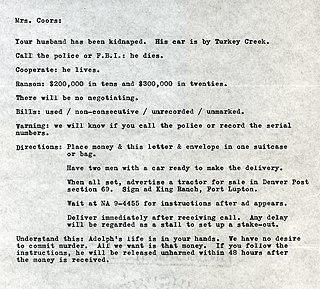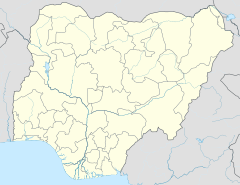
Maiduguri is the capital and the largest city of Borno State in north-eastern Nigeria, on the continent of Africa. The city sits along the seasonal Ngadda River which disappears into the Firki swamps in the areas around Lake Chad. Maiduguri was founded in 1907 as a military outpost by the British Empire during the colonial period. As of 2022, Maiduguri is estimated to have a population of approximately two million in the metropolitan area.
Mubi is a town in Northern Senatorial District of Adamawa State, northeast Nigeria. It is subdivided into two. Mubi north and Mubi south

Boko Haram, officially known as Jamā'at Ahl as-Sunnah lid-Da'wah wa'l-Jihād, is an Islamist jihadist organization based in northeastern Nigeria, which is also active in Chad, Niger, northern Cameroon, and Mali. In 2016, the group split, resulting in the emergence of a hostile faction known as the Islamic State's West Africa Province.

Gwoza is a local government area of Borno State, Nigeria. Its headquarters are in the town of Gwoza, a border town "about 135 kilometres South-East of Maiduguri." The postal code of the area is 610.

The Bauchi Prison break was an attack on the federal prison in the North-Eastern Nigerian city of Bauchi, in which members of Boko Haram released 721 prisoners. The attack occurred on September 7, 2010, and was carried out by approximately 50 gunmen. Of the 721 prisoners who escaped, as many as 150 were affiliated with the terrorist group Boko Haram. The Bauchi prison break was part of a broader escalation of Boko Haram activity, that escalation served as retaliation for the death of one of the group's primary leaders. Following this, Boko Haram has staged multiple subsequent attacks on government and religious targets in Bauchi state.
On 6 July 2013, Boko Haram insurgents attacked the Government Secondary School in the village of Mamudo in Yobe State, Nigeria and killed at least 42 people. Most of the dead were students, though some staff members were also killed.
Timeline of the Boko Haram insurgency is the chronology of the Boko Haram insurgency, an ongoing armed conflict between Nigerian Islamist group Boko Haram and the Nigerian government. Boko Haram have carried out many attacks against the military, police and civilians since 2009, mostly in Nigeria. The low-intensity conflict is centred on Borno State. It peaked in the mid-2010s, when Boko Haram extended their insurgency into Cameroon, Chad and Niger.
The May 2014 Buni Yadi attack was a terrorist attack that occurred on 27 May 2014 in the town of Buni Yadi, Yobe State, Nigeria. Some 49 security personnel and 9 civilians were killed.
The following lists events from 2014 in Nigeria.
The following lists events that happened in 2013 in Nigeria.

The Kogi prison break was an attack on Koto-Karffi Federal Medium Security Prisons in Kogi State, in north-central Nigeria by unknown gunmen suspected to be members of the terrorist group, Boko Haram. The attack occurred on 2 November 2014. About 144 prisoners escaped from the prison; 1 inmate was shot and killed during the attack. The escaped prisoners were largely awaiting trial for robbery. Twelve inmates returned to the prison to serve out their sentences and about 45 escaped prisoners were recaptured altogether.
The following lists events that happened during 2012 in Nigeria.

Kidnapping is a major problem in Nigeria in the early 21st century. Kidnapping by bandits and insurgents is among the biggest organised or gang crime in Nigeria and is a national security challenge.
The following is a list of events in 2020 in Nigeria.

Since 2015, the border area between Burkina Faso, Mali, and Niger has been a hotbed for jihadist forces originating from Mali. The insurgency has taken place in two distinct regions of Niger. In southwest, the Islamic State in the Greater Sahara and the Nusrat al-Islam have carried out attacks in the tri-border area with Burkina Faso and Mali. Meanwhile, in the southeast, the Islamic State in the West African Province has established control in parts of southern Niger.
On 5 June 2022, a mass shooting and bomb attack occurred at a Catholic church in the city of Owo in Ondo State, Nigeria. At least 40 people were killed, with the highest estimates being around 80. Some in the federal government of Nigeria suspect the Islamic State – West Africa Province of carrying out the massacre.
On June 30, 2022, gunmen ambushed Nigerian soldiers responding to a distress call of an attack on a mining village. Forty-eight people died, including thirty-four soldiers, eight policemen, and six civilians. The attack is one of the deadliest ambushes in Nigeria in recent years.







